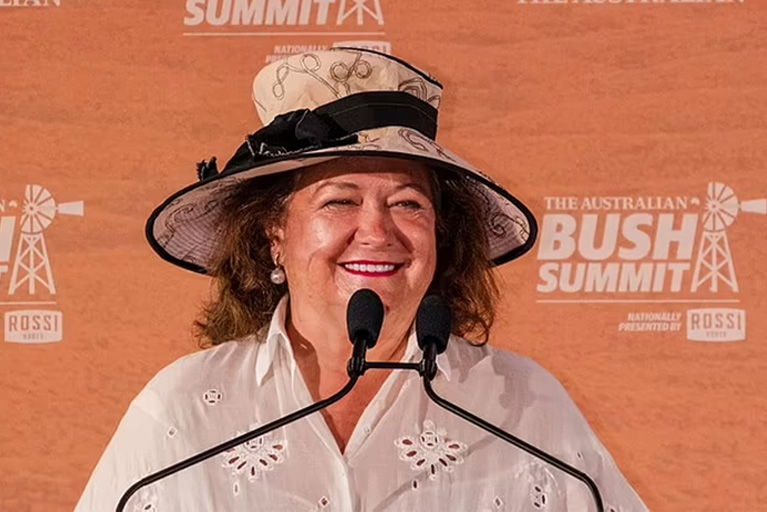
Article by Padraig Collins, courtesy of the Daily Mail Australia.

Australia’s richest person Gina Rinehart has called for Israeli-style Iron Dome missile defence systems to protect the country’s mining assets in the nation’s north because of their crucial economic role.
In an address to the Bush Summit in Port Hedland, WA, Mrs Rinehart issued dire warnings that Australia is headed for economic and defence crises without a change in approach.
Mrs Rinehart told her audience that over the past decade, Australia’s mining industry has earned trillions of dollars in export earnings.
She noted this revenue in turn supported many Aussie businesses and paid $252billion in wages and $357billion in taxes and royalties over the last 10 years. These taxes and royalties allowed Australia to provide for nurses, police, defence, veterans, elderly, emergency services and more.
But the mining magnate said if plans to get to 100 per cent renewable energy ever actually happened, the country’s economy would be stripped of this revenue.
That created a conundrum, she said. ‘Which services would you like cut without the mining industry revenue, and how much more tax would you like to pay?
‘Why jeopardise this bonanza, why kill the geese laying the golden eggs?’
A nuclear power advocate, Mrs Rinehart argued that ‘the truth’ is that ‘sustainable energy can’t underpin our base power load requirements, the sun doesn’t always shine, wind doesn’t always blow, the additional capital to try to hook this in will be humongous’.
Mrs Rinehart did not say there was no value to renewable sources of energy. But she pointed out what she sees as their severe limitations.
‘In Australia solar panels generate electricity for about 20-25 per cent of the year,’ she said.
‘Wind is only a little better, typically it has a ‘capacity factor’ between 30-40 per cent.’
‘Hydropower can be a little better again, perhaps generating power 50 per cent of the time (but) compare those to coal and natural gas.
‘These thermal power plants typically have capacity factors between 70-90 per cent because they can generate electricity consistently as long as fuel is available.’
The businesswoman then made a case for nuclear power, which has been promised by Opposition Leader Peter Dutton if the Coalition wins the coming federal election, which is due by next May.
‘Although it’s not here – well not yet – nuclear power would be the best of the lot, operating over 90 per cent of the time as it requires less maintenance and is designed to operate for longer stretches,’ Mrs Rinehart said.
Proposal to pay for a stronger defence force
She also addressed Australia’s defence spending, which she said is ‘unrealistically and irresponsibly limited’.
‘The government’s most important responsibility … is the defence of our country,’ she said, adding that this too is inextricably linked to the mining industry.
‘It’s no good having the resources in the Pilbara unless we can export them and receive revenue from them, hence we should have defence to keep our railways and ports open, and our vital sea lanes.’
Mrs Rinehart said a bigger defence spend would be achievable if Australia allowed more mines to open and cut red tape.
Borrowing from Donald Trump’s ‘drill, baby, drill’ phrase, she said ‘dig baby dig! Get rid of the government obstacles delaying development, and instead turn (mining for minerals) into revenue urgently’.
She said the world must learn from what’s happening in Ukraine ‘that warfare is changing, and hence our defence thinking needs to change too’.
‘One glaring example is Ukraine-made war drones costing little but destroying a $1billion Russian naval ship. We need defence investment that works today.’
Mrs Rinehart said the Pilbara mining region ‘should have the protective iron domes like the ones in Israel, plus war drones and smart sea mines, plenty of them, and similarly across our sea lanes and ports and some islands, from the north west through to the north east’.
She said that a stronger defence capability was also necessary as ‘we have only seven days of fuel reserve in Australia’.
‘It is critical that we can keep our sea lanes open to receive fuel, be that from Singapore, USA or elsewhere.
‘We may have the attitude, let’s not spend on our defence, let’s rely on the USA, but how would that work in reality if we can’t protect our sea lanes and ports so they can enable fuel, defence equipment and heavy supplies from the USA to reach us.’














